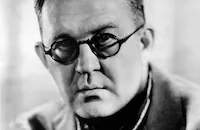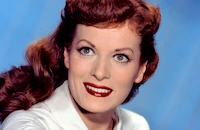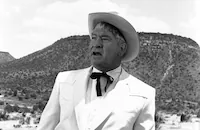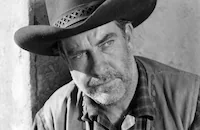Rio Grande

Brief Synopsis
Cast & Crew
John Ford
John Wayne
Maureen O'hara
Ben Johnson
Claude Jarman Jr.
Harry Carey Jr.
Film Details
Technical Specs

Synopsis
Some time after the Civil War, at a U.S. Cavalry fort near the Rio Grande River, soldiers and their prisoners return after a battle againstthe Apache. The Indians have been leading raids from the Mexican side of the border where the troopers are forbidden to follow. Upon his return to the fort, Col. Kirby Yorke learns that his son Jefferson, whom he has not seen for fifteen years, has been dropped from West Point after failing mathematics. Shortly after, Yorke, a no-nonsense career soldier, gives a new batch of recruits a harsh speech about the difficulties facing them, and then discovers that Jeff is among them. Privately, he later warns his son not to expect special treatment because of their kinship. Far from wanting favoritism from his father, Jeff pushes himself to prove that he can be a good soldier, despite his failure at West Point. During a riding lesson, a U.S. deputy marshal arrives in search of Trooper Travis Tyree, a Southerner who has been accused of manslaughter, but the other recruits keep him hidden. Later, Jeff starts a fight with recruit Heinze, who has insulted Yorke and called Yorke's old friend Sgt. Maj. Tim Quincannon, a "chowder-headed Mick." Quincannon stops the fight, but when he learns the reason for their dispute, instructs them to return that evening to settle their disagreement. This time, the fight is interrupted by Yorke, who demands an explanation. Both Heinze and Jeff refuse to answer, and then apologize and shake hands. One day, Yorke's estranged southern wife Kathleen arrives at the fort and tries to buy her son's discharge from the army. Yorke refuses to sign the necessary release, stating that he will not interfere with Jeff's decision. Both Yorke and Kathleen are still strongly attracted to each other, although neither will admit it, and Yorke leaves Kathleen to spend the night alone. Quincannon then escorts Kathleen to Jeff's tent. When he learns why she has come, Jeff, as his father anticipated, refuses to leave. That night, Apaches attack the fort and rescue the soldiers' prisoners. Yorke leads his men as they go after the fugitives, and while he is gone, Tyree is arrested. Kathleen objects, believing that "Yankee justice" has falsely accused the nice young southerner. Later, Quincannon reveals that fifteen years ago, during the Civil War, Gen. Sheridan ordered Yorke to burn down the plantation operated by Kathleen's family and that is why she left him and prevented him from seeing his son. Meanwhile, Yorke's men meet with some Mexican soldiers in the middle of the Rio Grande. Yorke suggests that they disregard the orders of their governments and work together to catch the renegade Apaches but cannot persuade the Mexican lieutenant. Back in camp, Kathleen is waiting for Yorke's return. They embrace and, after Yorke apologizes, they discuss their marriage. She again pushes for their son's release, but Yorke maintains that Jeff must learn to honor his word. That night at dinner with Sheridan, Kathleen toasts her only rival, the U.S. Cavalry. At the infirmary, where he is incarcerated, Tyree admits that a dispute over his sister led to a violent encounter with a Yankee, but insists that he did not kill him. Soon after, Tyree escapes on Yorke's horse. Expecting more Indian attacks, Yorke evacuates the women and children to Fort Bliss, assigning Jeff to be one of the escorts. Although she realizes that Jeff will be unhappy that he will not be among the soldiers, Kathleen is grateful. The evacuation begins, but soon the small group is under Apache fire, and Jeff is ordered to carry news of the attack to Yorke. By the time Yorke and Dr. Wilkins arrive, the Indians have captured the fort's children. When Tyree, who has been hiding nearby, approaches the regiment, Yorke orders him arrested, but Tyree reports that he has scouted the Apache camp in a village on the Mexican side of the river, where the children are being held in a church. He offers to try to rescue them with two men of his choice. Yorke is worried when one of the chosen is Jeff, but allows them to proceed. While the three men sneak into the church, Yorke leads the regiment across the Rio Grande. Once the children are organized, one of the girls rings the church bell to summon the soldiers. During the ensuing battle, Yorke is shot in the chest with an arrow. On Yorke's orders, Jeff removes the arrow from his father's chest and and helps him onto his horse for the ride back to the fort. Kathleen is waiting, and holding Yorke's hand, accompanies her husband to the infirmary. Later, under Yorke's proud gaze, Jeff receives a commendation for bravery. In the middle of the ceremony, Tyree steals Sheridan's horse and escapes from the deputy marshal with Yorke's encouragement. The regiment then marches off to the strains of "Dixie," played in Kathleen's honor.

Director

John Ford
Cast

John Wayne

Maureen O'hara

Ben Johnson

Claude Jarman Jr.

Harry Carey Jr.

Chill Wills

J. Carrol Naish

Victor Mclaglen

Grant Withers
The Sons Of The Pioneers

Ken Curtis
Hugh Farr
Karl Farr
Lloyd Perryman
Shug Fisher
[tommy Doss]
Peter Ortiz
Steve Pendleton
Karolyn Grimes
Alberto Morin
Stan Jones
Fred Kennedy

Eve March
Chuck Roberson
Jack Pennick
Patrick Wayne
Cliff Lyons
Crew
Thomas S. Allen
Merian C. Cooper
Earl Crain Sr.
Dale Evans
John Ford
Bert Glennon
Peggy Gray
Ira Hoke
R. Dudley Holmes
Frank Hotaling
Isham Jones
Stan Jones
Peader Kearney
Maj. Philip J. Kieffer
Howard Lydecker
Theodore Lydecker
Cliff Lyons
Bob Mark
John Mccarthy Jr.
James Kevin Mcguinness
Jack Murray
Ole Olsen
D. R. Overall-hatswell
Tex Owens
Adele Palmer
P. J. Ryan
Wingate Smith
Archie Stout
Tell Taylor
Charles Thompson
Thomas P. Westendorf
Howard Wilson
Herbert J. Yates
Victor Young

Videos
Movie Clip




Film Details
Technical Specs

Articles
Rio Grande - John Wayne in the 1950 John Ford Western, RIO GRANDE
The cavalry trilogy is not a series, as John Wayne plays a different character in each. Rio Grande teamed Wayne for the first time with his lasting co-star Maureen O'Hara. Ford welcomed the talented and beautiful actress into his group of favored players, many of which were Irish Americans.
This cavalry epic is more conventional and commercially minded than the first two. Lieutenant Colonel Kirby Yorke (John Wayne) is surprised to find that the son he has not seen since the end of the Civil War is a new trooper in his frontier command. Young Jefferson Yorke (Claude Jarman Jr.) flunked out of West Point and immediately enlisted as a regular cavalry soldier. Kirby has also been separated from his wife Kathleen (Maureen O'Hara) for a full fifteen years; she left him after his Union troops burned all the homes in the Shenandoah Valley, including hers. Kathleen arrives with the intention of buying Jeff's release from the army but both husband and son refuse to cooperate. She instead joins the rest of the officers' wives and tries to repair her lost marriage. Young Jeff proves himself through his horse-riding ability and a "soldier's fight". Kirby treats his son as he would any other trooper, although his Sgt. Major Quincannon (Victor McLaglen) keeps a protective eye on the boy. Young Yorke makes the grade in every category. Trouble comes when the renegade Apache leader Natchez gathers three tribes on the border river with Mexico, the Rio Grande. General Sheridan (J. Carrol Naish) gives Col. Kirby unofficial orders to illegally cross the border and destroy the warriors. Before that can happen Natchez's Apaches attack a wagon train from the fort, murder one woman and kidnap all of the officers' children. Able Troopers Travis Tyree (Ben Johnson) and Daniel "Sandy" Boone (Harry Carey Jr.) take Jefferson Yorke with them to sneak into the Apache camp to affect a rescue.
John Ford continues his laudatory attitude toward the military. The U.S. Army is a masculine Utopia for men that want to live a hard life and fight their country's toughest battles. Unlike Fort Apache, Rio Grande doesn't examine the social situation in the service. Kathleen is the only woman in the fort with a speaking role. The dependent army kids are kept mostly out of sight until they're needed for a rescue scene.
Rio Grande is also a romantic warm-up for Ford's much more personal The Quiet Man. In that movie Irish-American John Wayne goes home to Eire to earn a loving home with the redheaded Maureen O'Hara. The central theme of Quiet involves setting up an honorable domestic household. Rio Grande is about a marriage that broke up over a house. In his role as a Union cavalryman in the Civil War, Kirby Yorke was forced to burn his own wife's home to the ground. Yet Kathleen's grudge against the army no longer seems a serious issue. Kirby and Kathleen give one another longing looks from the moment they are reunited. As her purpose for coming evaporates, we're not certain what exactly is keeping them apart. The wartime incident is revisited mainly when Kathleen shames Sgt. Quincannon by repeatedly calling him an arsonist.
Ford keeps the Irish clowning, boozing and brawling to a minimum but Victor McLaglen is still there to snap up unguarded beer bottles and to dispense comedy haymakers to mouthy Troopers. The scene where Jeff York is awakened by the smiling faces of his enlisted pals is meant to be a heartwarming display of the Army As Family. The sequence of men grinning intently at a boyish Jeff now looks more like a scene from a '70s prison picture.
Director Ford also gives star billing to the cowboy singers The Sons of the Pioneers, padding his movie with at least ten minutes of serenades by "The Regimental Singers". Future Ford player Ken Curtis is the lead tenor; one of the songs is a Yee-hah ditty written by none other than Dale Evans. They also croon the traditional "I Will Come To Take You Home, Kathleen", an un-subtle reference to Kathleen and Kirby's relationship. Ford was reaching for fresh blood for his stock company. Having discarded John Agar, the director put his weight behind rodeo champion and stuntman Ben Johnson, and continued the 'family line' with the son of silent movie star Harry Carey. Only Victor McLaglen seems a holdover from previous decades, along with familiar bit players like the mug-faced Jack Pennick.
Rio Grande shows John Ford taking a major backward step from his former liberal stance. Fort Apache lauded the Army but presented a highly critical portrait of a George Armstrong Custer-like martinet and glory hunter, who leads his troop on an unnecessary suicide mission. She Wore A Yellow Ribbon is a pacifist, somewhat wistful story of a veteran officer who wants to retire -- both he and his Indian chief counterpart disapprove of "young braves" that agitate for more war and bloodshed.
This third cavalry picture does a political about-face to favor a militarist posture. The Indians are reduced to bloodthirsty savages that must be put down forcibly. The dithering fools in Washington impose rules that restrain the army's ability to fight. The main topic of conversation between Col. Yorke and General Sheridan is the ban against crossing the Rio Grande, to wipe out the hostiles that use Mexico as a safe haven for their raids. When Rio Grande was released in November of 1950, America was already bogged down in Korea after six months of fighting. Our military leaders expressed frustration that the Reds could simply duck across the Yalu River into China when things got too tough. As if supporting General MacArthur, Rio Grande would seem to endorse taking the war right into China.
The rescue of the children gives Rio Grande a needed big action ending. It plays like something out of a silent movie, or Ford's own Drums along the Mohawk or even Mighty Joe Young: when in need of a sentimental finish, threaten a child. Ford even reaches for symbolism by showing his brave troopers shooting at the Indians through a slot in the chapel door shaped like a Christian cross. 1950 was the year of Delmer Daves' overcompensating "Indians are good" western hit Broken Arrow, and Anthony Mann's fiery Indian Civil Rights movie Devil's Doorway. Ford's westerns would soon reflect the Civil Rights era by showing more sensitivity to the plight of Indians and other minorities, but the growing militarism in his movies never abated.
Olive Films' Blu-ray of Rio Grande looks quite handsome. Bert Glennon's sunlit scenes yield more detail in the added resolution of HD. We can better appreciate photographic effects achieved by shooting at dusk and in the early morning hours.
Olive has also improved its packaging and menu design, although more proofreading would help -- the menu incorrectly lists a 1993 featurette as being about High Noon. Host Leonard Maltin interviews the late Michael Wayne and actors Harry Carey Jr. and Ben Johnson. Johnson talks about signing his contract with Ford and the movie's two-horse "Roman" riding stunt. He offers a few anecdotes about John Ford's dictatorial cruelty on location, while Harry Carey Jr.'s memories are more reverential.
For more information about Rio Grande, visit Olive Films.
by Glenn Erickson

Rio Grande - John Wayne in the 1950 John Ford Western, RIO GRANDE
Rio Grande
Rio Grande was the result of a brief alliance between Ford's Argosy Productions and Republic Studios (Wayne made many pictures at Monogram, one of the companies that preceded Republic). Ford's relationship with Republic producer Herbert Yates was a prickly one; by 1950, Ford had his sights set on The Quiet Man, a movie that would become a classic for Ford and Wayne both. Yates, however, insisted on a solid box-office film from Ford before he'd consider investing in The Quiet Man. The result was Rio Grande, an archetypal cavalry Western.
Based on Bellah's "Mission With No Record", Rio Grande finds Wayne reprising his role as Col. Kirby Yorke, assigned to a remote outpost on the Rio Grande with an assignment to train fifteen recruits, one of whom is his son he's not seen in years. His mother shows up to remove him, but the young trooper decides to stay and fight the Apaches. Soon Yorke finds himself locked in a family conflict and a bloody Indian war, facing the possibility of a court-martial for his unorthodox tactics.
Shot on location in Moab, Utah, Rio Grande was treated as an exercise by Ford (Harry Carey, Jr. called it one of the director's "vacation pictures"). The budget was half of the production costs for Fort Apache, and no one, Ford included, seemed to take the project very seriously. The director was especially irritated when producer Yates showed up on location with fellow Republic executive Rudy Ralston. Pointing out the time (it was ten in the morning), Yates asked when Ford intended to start shooting; "Just as soon as you get the hell of my set", Ford supposedly replied. The director later played a practical joke on the two producers at dinnertime. He hired one of his actors, Alberto Morin, to masquerade as a French waiter with poor English skills. During their meal, Morin managed to spill soup on the men, break several plates, and create a general ruckus in the dining room but Yates and Ralston never seemed to catch on to the joke.
In June 1950, while Rio Grande was being filmed in Utah, North Korea was invading South Korea. By late November, when the picture was in theaters, Chinese forces were attacking U.S. positions in North Korea. General Douglas MacArthur suggested using atomic weapons against the Chinese but President Harry Truman opposed the idea. This conflict between diplomatic tact and defense through aggression was certainly a timely theme and the subplot of Rio Grande mirrored a similar situation.
One last bit of trivia: Rio Grande features nine songs, many of which are performed by the Sons of the Pioneers. It was also the first of five films in which John Wayne and Maureen O'Hara starred together, the others being The Quiet Man (1952), The Wings of Eagles (1957), McLintock! (1963), and Big Jake (1971).
Producer: Merian C. Cooper, John Ford, Herbert J. Yates
Director: John Ford
Screenplay: James Warner Bellah (story "Mission With No Record"), James Kevin McGuinness
Art Direction: Frank Hotaling
Cinematography: Bert Glennon
Costume Design: Adele Palmer
Film Editing: Jack Murray
Original Music: Dale Evans (songs), Stan Jones (songs), Tex Owens (songs), Victor Young
Principal Cast: John Wayne (Lieutenant Colonel Kirby Yorke), Maureen O'Hara (Mrs. Kathleen Yorke), Ben Johnson (Trooper Travis Tyree), Claude Jarman Jr. (Trooper Jeff Yorke), Harry Carey Jr. (Trooper Daniel "Sandy" Boone), Chill Wills (Doctor Wilkins), Victor McLaglen (Sergeant Quincannon), J. Carrol Naish (General Sheridan).
BW-105m. Closed captioning.
by Jerry Renshaw
Rio Grande
Quotes
To my only rival, the United States Cavalry.- Mrs. Kathleen York
I don't want you men to be fooled about what's coming up for you. Torture, at least that. The War Department promised me 180 men. They sent me eighteen. You are the eighteen...so each of you will have to do the work of ten men. If you fail, I'll have you spread-eagled on a wagon wheel. If you desert, you'll be found, tracked down and broken into bits. That is all.- Lt. Col. Kirby York
But put out of your mind any romantic ideas that it's a way of glory. It's a life of suffering and hardship, an uncompromising devotion to your oath and your duty.- Lt. Col. Kirby York
But he must learn that a man's word to anything, even his own destruction, is his honor.- Lt. Col. Kirby York
I'm going to issue you an order and give it to you personally. I want you to cross the Rio Grande, hit the Apache and burn him out. I'm tired of hit-and-run. I'm sick of diplomatic hide-and-seek.- Gen. Philip Sheridan
Trivia
Although playing the same character as in Fort Apache (1948), 'Wayne, John' 's character is spelt with an extra "e" at the end.
Two stunt men drowned while filming a river crossing sequence.
Notes
The working titles of this film were Rio Bravo and Rio Grande Command. In the onscreen credits, technical advisor Maj. Philip J. Kieffer's name was credited as "Maj. Philip J. Kieffer USA." Rio Grande was the last film in John Ford's cavalry trilogy. (For additional information on the trilogy, see entry above for Fort Apache.) Rio Grande, which was Ford's first picture for Republic, was shot on location in Moab, Monument Valley and Mexican Hat, UT. According to a modern source, Rio Grande was made as part of a deal to secure financing for Ford's The Quiet Man, which Herbert Yates agreed to back on the condition that Ford, Wayne, O'Hara, Victor McLaglen and Barry Fitzgerald first make a western for him. In a December 17, 1995 Los Angeles Times article, O'Hara discussed the arrangement: "Yates read the script and said: 'This is a silly, little Irish story and it will never make a penny, but if the same director and the same producer [Merian C. Cooper] make me a film with the same actors-a western to make up the money you are going to lose on this story-I will finance it." According to a modern source, while on location in Moab, the crew "brought fifty Navajo up from the reservation to play Apache in the film, accompanied by Lee Bradley, who again served as translator. Billy Yellow, one of the Indians selected for closeups, stated forty years later that the Navajo weren't told that they were portraying Apache." Rio Grande was the first film in which Wayne acted with his son Patrick, and was also the first casting of Maureen O'Hara opposite Wayne. They went on to make four additional movies together. Modern sources add the following names to the crew credits: Assistant Editor Barbara Ford and 2nd Unit Director Cliff Lyons.

Miscellaneous Notes
Released in United States Fall November 15, 1950
Formerly distributed in USA on video by Republic Home Video.
Released in United States Fall November 15, 1950













